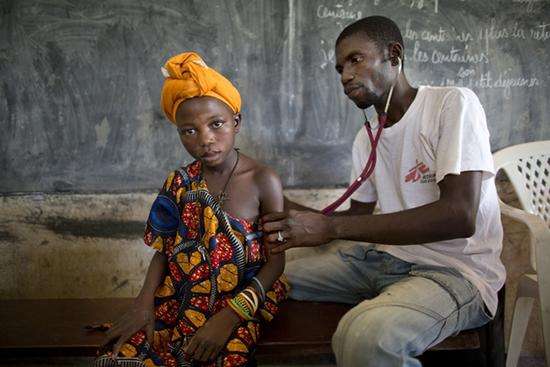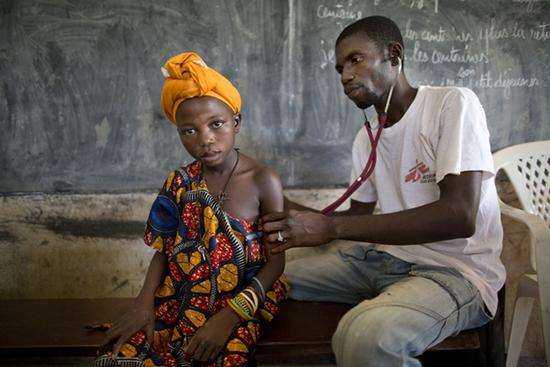MSF nurse Brigitte Doppler provides an update on the health situation in eastern Central African Republic, an area heavily impacted by conflict.
In early May, Doctors Without Borders/Médecins Sans Frontières (MSF) began an assessment of the health situation and the medical needs in eastern Central African Republic (CAR), an area that was heavily impacted by the offensive launched late last year by anti-government Seleka rebel militia. The violence took an even deeper toll on health care facilities that had already been in a state of collapse, and the needs subsequently increased dramatically. Brigitte Doppler, the MSF nurse overseeing the assessment, provides an update.
“According to OCHA (the United Nations Office for the Coordination of Humanitarian Affair), 200,000 people were displaced during the Seleka offensive, principally in areas in the center of the country. We decided to assess needs in what’s known as health region 4, which includes Bambari and Grimari, and health region 5, which includes Bria, Ouadda, Yalinga, Ouandja, Djalle, and Birao. The objective of the assessment is to determine the area where intervention would be most relevant and could be deployed most rapidly—ideally before roads become impassable at the start of the rainy season in June.
The health situation is critical. Due to the insecurity and because people were forced to flee, there has been less agricultural activity and the upcoming September harvest is expected to see a shortfall. The threat of a nutrition crisis is all too real. And the health authorities in the areas we have visited have reported a surge in malaria as well. Due to the onset of the rainy season, population displacements, and drug shortages, outbreaks of malaria and contagious fecal-oral diseases (cholera, for example) are to be feared. We have observed an increase in cases of typhoid in Bambari, too.
The collapse of health facilities and lack of access to medical care have been exacerbated by the violence, looting, and abuses that occurred during the Seleka offensive. Most staff deserted health centers to take refuge in the bush or go to the capital city, Bangui. Almost all the facilities have been left empty and some have been looted. The routine vaccination program has been suspended either because the cold chain cannot be maintained, or because equipment and vehicles have been stolen or damaged.
Apart from MSF donations, there have been no supplies of drugs and medical equipment and there are no blood bags left. Three children died from severe anemia during our visit to the hospital in Bria because they could not get a blood transfusion.
Bambari has received donations, medical personnel have returned, and the hospital is able to function because it was not looted. On May 30, MSF donated blood bags, basic supplies for the operating theater, screening tests, malaria treatments, and antibiotics to Grimari health center and Bambari hospital.
But, Bria has been totally deserted. In health region 5, the distances between health facilities are substantial and roads become impassable from June to August because of the rains. Since the donation made by MSF in December 2012, the region has received no drugs whatsoever. Almost all the health facilities have been looted and closed down as their equipment has been stolen. There are no ambulances and the health workers have fled.
Malaria cases represent 82 percent of consultations at the hospital. The price of basic necessities has doubled or even tripled. MSF is going to donate emergency kits for 10,000 people for three months, drugs, screening tests, malaria treatments, antibiotics, and blood bags, etc., to restock health centers and the hospital before the area becomes unreachable.
These supplies will be transported from Bria to accessible outlying facilities in two MSF vehicles; deliveries will be made to the more inaccessible facilities by motorbike or carried on people’s backs. We will also provide local health worker teams with fuel to enable them to pass on the supplies to those areas where our teams cannot go due to the lack of security.
We are going to monitor the epidemiological situation closely and stand ready to intervene in the event of any outbreaks. We are looking into conducting exploratory missions in more areas and the possibility of other interventions.”
Malaria alert
Treating malaria is one of MSF’s priorities in CAR. In Paoua, MSF diagnosed and treated over 15,600 cases from January to May 2013. Some 468 patients were hospitalized, 425 in the pediatric unit, and 6.1 percent of these children died. Antenatal care was also provided to 1,236 pregnant women with malaria.
MSF has been working in CAR since 1996. The organization is present throughout the country, regardless of which side of the conflict is in control, and runs eight projects in five of the seven health districts. MSF supports 7 hospitals and around 38 health centers with primary health care, HIV and tuberculosis treatment, malnutrition, neglected diseases, immunisation, surgery, and more.





